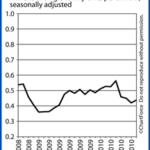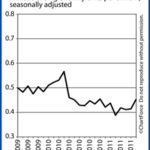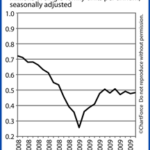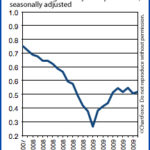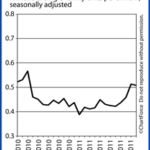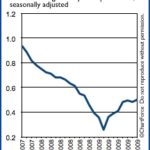Starts Include Single Family Homes, Apartments & 2-4 Unit Homes
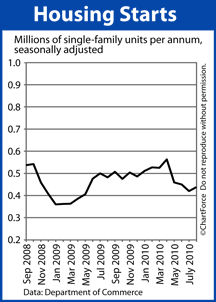 Annualized Single-Family Housing Starts dropped 1% in January to 413,000 units nationwide, it’s lowest reading almost 2 years.
Annualized Single-Family Housing Starts dropped 1% in January to 413,000 units nationwide, it’s lowest reading almost 2 years.
A “Housing Start” is defined as a home on which construction has started.
Now, if you had only seen the Housing Starts story in the headlines today, you wouldn’t have known that single-family starts fell at all. It’s because of how the story is being reported. You can’t blame the news sources to want to put a positive spin on things though, right?!
Most commonly, newspaper headlines are reading something similar to “Housing Starts Jump 14.6%” with the lead paragraph making mention that “housing starts are at their highest levels in 4 years”.
It’s a true statement, but it’s misleading, too.
This is because, despite the Census Bureau reporting Housing Starts by property type — single-family, multi-family, and apartments — the media often lumps them into a single data set.
It’s a categorization that helps investors in homebuilder stocks, but it does little for everyday Des Moines home buyers. The huge majority of buyers aren’t buying multi-units or whole apartment buildings — they’re buying 1-unit homes.
Here’s How January’s Housing Starts Broke Down:
- Single-Family Homes : Down 4,000 units, or -1%
- 2-4 Unit Homes : Negligible change
- Apartment Buildings : Up 46,000 units, or +80%
Clearly, the surge in Housing Starts can be attributed to the rapid rise in the 5-unit-or-more sector. Single-Family Starts were weak, by comparison.
Even with all of this noted, however, we can’t even be certain that the January Housing Starts data is accurate anyway. A footnote in the government’s report shows that, although single-family starts are said to have decreased 1%, the data’s margin of error is ±8.6%.
This means that the true Single-Family Housing Starts reading may be anywhere from -9.6% to +7.6%. The data is throw-away. Housing Starts may have actually increased in January, but we won’t know until revisions are offered later this year.
If you’re considering buying or selling a home, these statistics can be very helpful in telling the direction of the market. However, it’s important to get the opinion of a professional (Realtor) to help you navigate the process. If you don’t currently have that lined up, let me know. I’d love to help you get connected with the right real estate professional to work with.
